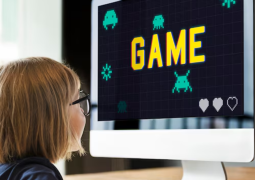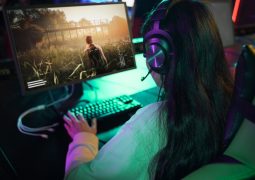Teenagers Fighting Internet Gaming Disorder
by ago0

Are you finding it increasingly challenging to tear your teenagers away from the captivating world of online gaming? You’re not alone. The rise of internet gaming disorder among adolescents has become a prevalent concern in today’s digital age. In this blog post, we’ll delve into the signs and symptoms of this disorder, explore its negative impacts on mental and physical health, offer practical tips for parents to support their teens, and discuss strategies for establishing a healthy balance between technology use and gaming. Let’s navigate through this virtual landscape together!
The rise of internet gaming disorder among teenagers
In recent years, the rise of internet gaming disorder among teenagers has sparked concerns among parents, educators, and healthcare professionals alike. With the accessibility of online games on various devices, adolescents are spending increasingly more time immersed in virtual worlds. This addictive behavior can lead to detrimental effects on their overall well-being.
The allure of constant engagement and instant gratification offered by online gaming can result in an unhealthy obsession that interferes with daily responsibilities and social interactions. As teens become consumed by the virtual realm, they may neglect crucial aspects of their lives such as academic performance, physical activity, sleep patterns, and interpersonal relationships.
Recognizing the signs early on is essential for addressing this growing issue effectively. By understanding the impact of excessive gaming on teenagers’ mental health and behavior, we can take proactive steps to support them in finding a healthier balance between screen time and real-life experiences.
Signs and symptoms of the disorder
Do you suspect that your teenager might be struggling with internet gaming disorder? Here are some signs and symptoms to look out for:
1. **Preoccupation**: Your teen is constantly thinking about gaming, even when they’re not playing.
2. **Withdrawal**: They become irritable or restless when they can’t play games.
3. **Loss of interest**: Other activities that were once enjoyable now take a backseat to gaming.
4. **Lying**: Your teen may lie about the amount of time they spend gaming.
5. **Neglecting responsibilities**: Schoolwork, chores, and social interactions start to suffer due to excessive gaming.
6. **Physical symptoms**: Headaches, eye strain, and carpal tunnel syndrome could indicate excessive screen time.
7. **Escaping reality**: Using gaming as a way to escape from stress or emotional difficulties in real life.
Recognizing these signs early on can help address the issue before it escalates further.
Negative effects on mental and physical health
The negative effects of internet gaming disorder on teenagers’ mental and physical health can be significant. Excessive gaming can lead to increased feelings of anxiety, depression, and isolation among adolescents. Spending long hours in front of a screen can also result in disrupted sleep patterns, leading to fatigue and decreased energy levels during the day.
Moreover, neglecting other important activities such as socializing with friends, exercising, or studying due to gaming addiction can have detrimental effects on overall well-being. Physical health may suffer from prolonged periods of sedentary behavior associated with excessive gaming. Poor posture, eye strain, and headaches are common complaints among teens who spend too much time playing video games.
It is crucial for parents to be aware of these potential consequences and take steps to support their teens in finding a healthy balance between technology use and other aspects of life. Professional help may be necessary in severe cases where the addiction has significantly impacted the teenager’s daily functioning.
How parents can help their teens struggling with internet gaming disorder
As a parent, it can be challenging to navigate the complexities of internet gaming disorder when your teenager is struggling. The first step is to open up a non-judgmental conversation with your teen about their gaming habits and how it’s impacting their life. Listen actively and try to understand their perspective.
Set clear boundaries around screen time and encourage other activities that they enjoy outside of gaming. Provide support and encouragement as they work towards finding a healthier balance in their life. Be patient and understanding during this process, as breaking habits takes time.
Consider seeking professional help if the situation seems severe or out of control. A therapist specializing in addiction or behavioral disorders can provide valuable guidance and support for both you and your teenager on this journey toward recovery.
Remember, your role as a parent is crucial in helping your teen overcome internet gaming disorder. By showing empathy, setting boundaries, and seeking appropriate help when needed, you can make a positive impact on their well-being.
Creating a healthy balance with technology and gaming for teenagers
As technology continues to evolve, finding a healthy balance between screen time and other activities is crucial for teenagers. Encouraging them to engage in physical exercise, Sbobet88 hobbies, and face-to-face interactions can help reduce excessive gaming. Setting clear boundaries and limits on screen time can also be beneficial.
Encourage open communication with your teens about their gaming habits and the importance of moderation. Help them understand the value of having diverse interests and activities outside of gaming. Consider implementing tech-free times or zones in your home to promote a balanced lifestyle.
Introduce alternative forms of entertainment that do not involve screens, such as board games, outdoor sports, or creative arts. Engage in these activities together as a family to model healthy behavior. Encourage your teens to pursue their passions and interests beyond the virtual world.
By fostering a supportive environment that values both technology and offline experiences, you can help teenagers establish a healthy relationship with gaming while maintaining overall well-being. Striking a balance between virtual reality and real-life experiences is key in promoting holistic development among adolescents.
Seeking professional help for severe cases of internet gaming disorder
Seeking professional help for severe cases of internet gaming disorder is crucial in providing teenagers with the support they need to overcome this challenging issue. Therapists specializing in addiction and mental health can offer tailored treatment plans to address the underlying causes of excessive gaming. Cognitive-behavioral therapy, family therapy, and mindfulness techniques are commonly used to help individuals manage their gaming habits and develop healthier coping strategies.
Remember that seeking help is not a sign of weakness but a proactive step towards regaining control over one’s life. If you or your teen are struggling with internet gaming disorder, do not hesitate to reach out for professional assistance. With the right support system in place, it is possible to break free from the grip of excessive gaming and create a more balanced and fulfilling lifestyle.



